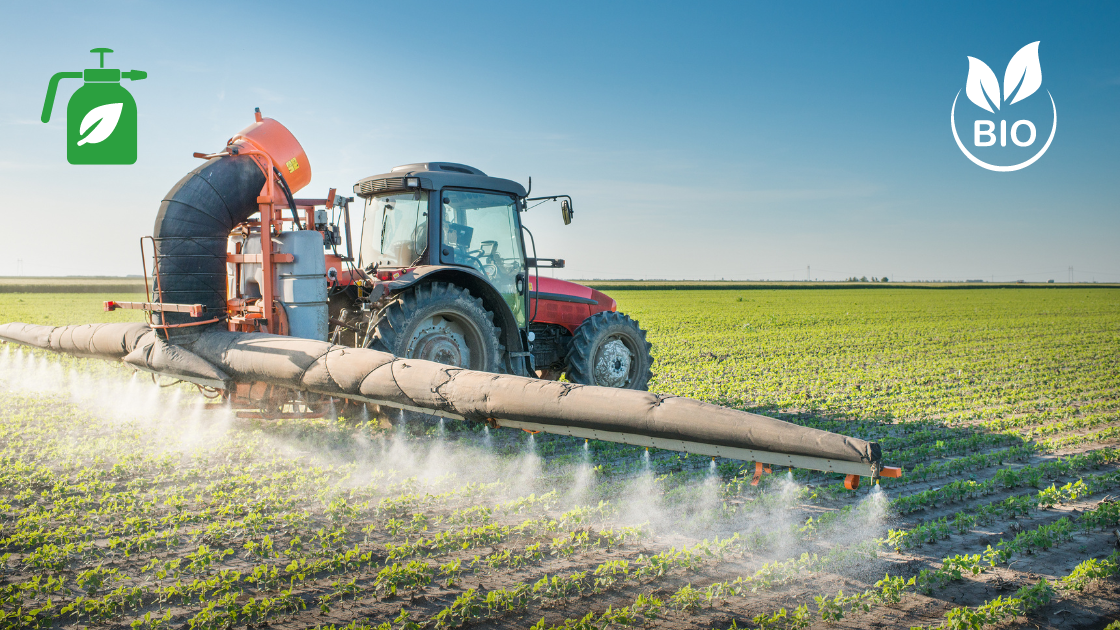Harnessing Nature’s Power: Exploring Biopesticides in Agriculture: In the quest for sustainable agriculture, biopesticides have emerged as a promising alternative to synthetic chemical pesticides. Derived from natural sources such as plants, microbes, and minerals, biopesticides offer effective pest control while minimizing environmental impact and promoting ecological balance. In this blog, we’ll delve into the history, types, and benefits of biopesticides, highlighting their role in shaping modern agriculture.
The Evolution of Biopesticides:
The use of biopesticides dates back centuries, with early civilizations harnessing the power of natural substances to protect crops from pests and diseases. Indigenous communities around the world developed botanical extracts, microbial formulations, and mineral compounds to control agricultural pests long before the advent of synthetic chemicals.
In the modern era, interest in biopesticides surged in response to growing concerns about the environmental and health impacts of chemical pesticides. The late 20th century witnessed a renewed focus on sustainable agriculture practices, spurring research and innovation in biopesticide development. Today, biopesticides represent a diverse array of products that offer targeted pest control with minimal risk to non-target organisms and the environment.
Types of Biopesticides:
Biopesticides can be classified into three main categories based on their sources and modes of action:
- Microbial Biopesticides: Microbial biopesticides consist of living microorganisms or their metabolic byproducts that target specific pests or diseases. Examples include bacteria, fungi, viruses, and protozoa. Microbial biopesticides work by infecting or parasitizing pests, disrupting their life cycles, or producing toxins that are harmful to pests. Bacillus thuringiensis (Bt), a bacterium that produces insecticidal proteins, is one of the most widely used microbial biopesticides.
- Botanical Biopesticides: Botanical biopesticides are derived from plant extracts, oils, or compounds with pesticidal properties. These natural substances often contain secondary metabolites that repel, deter, or disrupt the growth and development of pests. Examples of botanical biopesticides include neem oil, pyrethrum extract, and garlic extract. Botanical biopesticides are prized for their low toxicity to humans and beneficial insects, as well as their biodegradability.
- Biochemical Biopesticides: Biochemical biopesticides are synthesized compounds that mimic naturally occurring substances found in plants or animals. These bioactive molecules disrupt pest behavior, physiology, or biochemical processes, leading to pest mortality or suppression. Biochemical biopesticides may include pheromones, insect growth regulators, and repellents. They offer targeted control with minimal environmental impact and are often used in integrated pest management (IPM) strategies.
Benefits of Biopesticides in Agriculture:
The adoption of biopesticides offers numerous benefits for sustainable agriculture and environmental stewardship:
- Reduced Environmental Impact: Biopesticides are inherently less toxic to non-target organisms and pose minimal risk to beneficial insects, wildlife, and ecosystems. Their biodegradable nature ensures minimal persistence in the environment, reducing the accumulation of chemical residues in soil, water, and food.
- Enhanced Safety: Biopesticides are generally safer for farmers, farmworkers, consumers, and communities compared to synthetic chemical pesticides. Their low toxicity and non-toxic modes of action minimize health risks associated with pesticide exposure, promoting safer working conditions and public health.
- Integrated Pest Management (IPM): Biopesticides play a crucial role in IPM programs, which emphasize the use of multiple pest control strategies to minimize reliance on chemical pesticides. By integrating biopesticides with cultural practices, biological control agents, and monitoring techniques, farmers can achieve sustainable pest management while preserving natural resources and biodiversity.
- Resistance Management: Biopesticides offer an alternative mode of action against pests, reducing the selection pressure for resistance development. By rotating or alternating biopesticides with conventional pesticides, farmers can delay the onset of pesticide resistance and prolong the efficacy of pest control strategies.
Popular Biopesticides:
Several biopesticides have gained recognition and widespread use in agriculture due to their efficacy, safety, and environmental compatibility. Some popular biopesticides include:
- Bacillus thuringiensis (Bt): A bacterial biopesticide that produces insecticidal proteins toxic to certain insect pests, including caterpillars, beetles, and mosquitoes.
- Neem Oil: A botanical biopesticide derived from the neem tree (Azadirachta indica), known for its insecticidal, repellent, and antifeedant properties against a wide range of pests.
- Spinosad: A microbial biopesticide produced by the fermentation of soil bacteria (Saccharopolyspora spinosa), effective against various chewing and sucking insect pests.
- Beauveria bassiana: A fungal biopesticide that infects and kills insect pests through contact, particularly effective against soil-dwelling pests and foliar pests.
Conclusion:
Biopesticides represent a valuable tool in the pursuit of sustainable agriculture, offering effective pest control while minimizing environmental impact and promoting human health and safety. By harnessing the power of nature’s own defenses, farmers can manage pests in a manner that is both economically viable and ecologically responsible. As global demand for sustainable food production continues to rise, biopesticides are poised to play an increasingly prominent role in shaping the future of agriculture.







